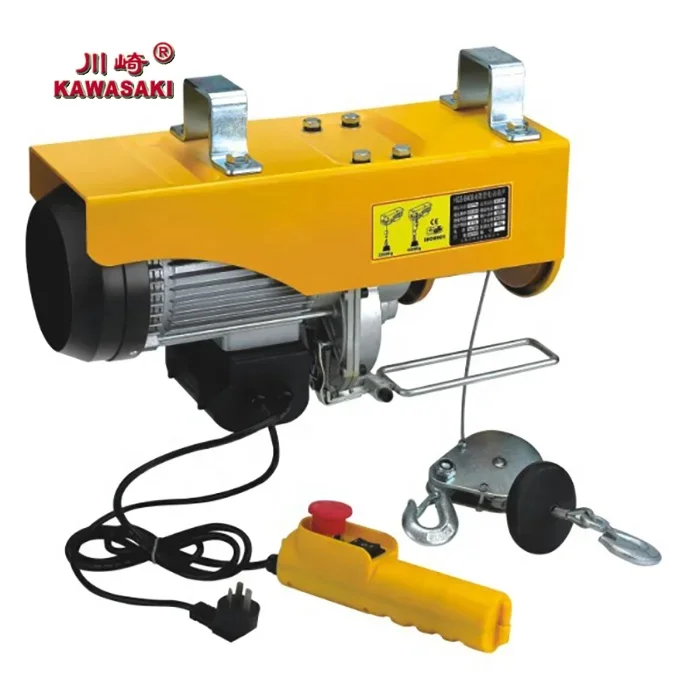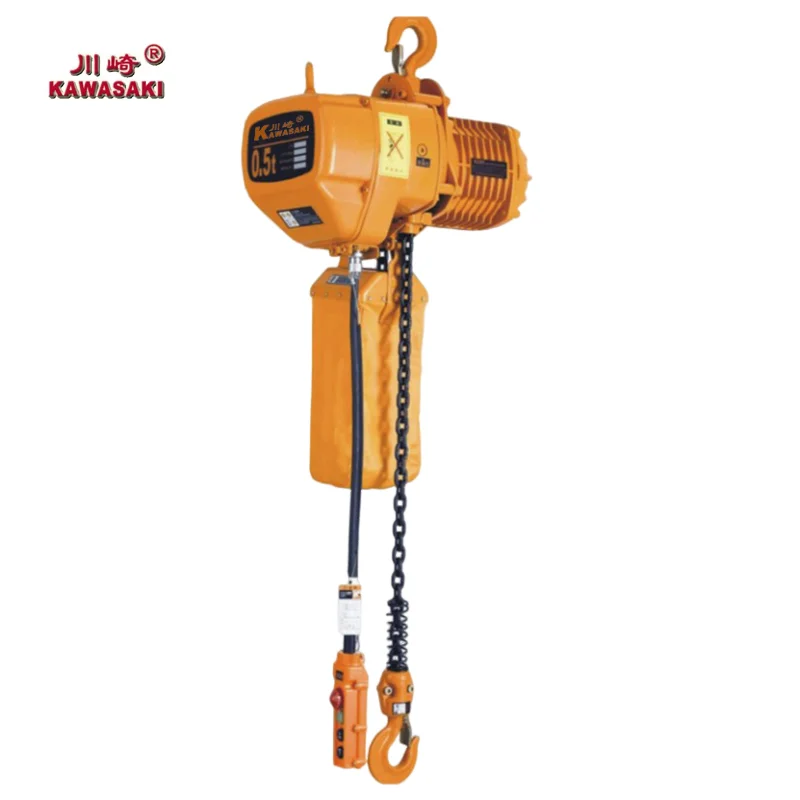Picking the perfect electric chain hoist for heavy lifting in factories or construction sites is super important. It helps things go smoothly, keeps everyone safe, and saves money. With tons of hoists out there, it’s tricky to find the right one. This guide will walk you through the big things to think about when choosing an electric chain hoist. We’re pulling tips from APOLLO, a top-notch company that makes awesome hoists like the KAWASAKI Electric Chain Hoist DCEK and KAWASAKI Electric Hoist KKBB. Let’s dive in!
Introduction to Electric Chain Hoists
Electric chain hoists are wicked cool tools for lifting heavy stuff in places like factories, warehouses, or building sites. They use an electric motor to make lifting easy-peasy, way better than old-school manual hoists. Choosing the right one means your work runs smooth, stays safe, and doesn’t cost a fortune.
1. Load Capacity and Lifting Height
The first big thing to check is how much weight the hoist can lift and how high it can go. These things decide if the hoist can handle your job.
Load Capacity
You gotta make sure the hoist can lift the heaviest thing you need without breaking or being unsafe. Electric chain hoists come in all sizes, from lifting a few hundred pounds to tons of weight. APOLLO’s KAWASAKI Electric Chain Hoist DCEK has lots of weight options and can be tweaked to fit your needs, so your work stays super smooth.
Lifting Height
How high you need to lift stuff matters too. You don’t want the hoist to stop short and cause delays. Figure out the max height for your job, and pick a hoist that can reach it. APOLLO lets you customize the KAWASAKI Electric Chain Hoist DCEK for different heights, so it’s perfect for all kinds of jobs.
2. Duty Cycle and Operational Frequency
The duty cycle tells you how often and how long a hoist can work before it needs a break. Different jobs need different duty cycles.
Duty Classification
Hoists get rated from H1 to H5. H1 is for light, once-in-a-while lifting, while H5 is for tough, non-stop jobs. If you’re lifting stuff all day, go for an H3 or H4 hoist. APOLLO’s KAWASAKI Electric Hoist KKBB is built tough for heavy-duty work, so it lasts long and lifts great in busy places.
3. Power Supply Compatibility
Electric chain hoists need power to work, so you gotta match them to your power setup.
Single-Phase vs. Three-Phase Power
Small jobs often use single-phase power, like in little shops. Bigger factories use three-phase power for heavy lifting. Pick a hoist that fits your power type. APOLLO offers hoists like the KAWASAKI Electric Chain Hoist DCEK that work with different power setups, from 110V to 575V, to match your needs.
Voltage Requirements
The hoist’s voltage has to match your power supply, or you could wreck the motor or make it work poorly. APOLLO’s hoists can be customized for all sorts of voltages, so they fit your setup perfectly.
4. Speed Control and Precision
How fast a hoist lifts and how well you can control it matters a lot for getting the job done right.
Single-Speed vs. Dual-Speed Hoists
For regular jobs, a single-speed hoist is fine. But if you need super careful lifting, dual-speed hoists let you go slow or fast for better control. APOLLO’s KAWASAKI Electric Hoist DCEK can come with two-speed options, so you get awesome control for tricky tasks.
Variable Frequency Drives (VFD)
A VFD is a cool gadget that lets you adjust the hoist’s speed super smoothly. It stops the load from swinging around, which makes things safer and more precise. APOLLO’s hoists, like the KAWASAKI Electric Hoist DCEK, can have VFDs added for extra control in all kinds of jobs.
5. Safety Features and Compliance
Safety is a huge deal when picking a hoist. You want one with features to keep workers and gear safe.
Overload Protection
Good hoists, like APOLLO’s, have overload protection. It stops the hoist if the load’s too heavy, keeping the machine from breaking and everyone safe.
Limit Switches and Emergency Stops
These stop the hoist if it goes too high or something goes wrong. They help avoid accidents or damage. APOLLO’s electric hoists, like the KAWASAKI Electric Hoist KKBB, meet big safety rules like CE and GS, and they come with stuff like limit switches and overload protection for super safe lifting.
6. Environmental Considerations
Where you use the hoist matters a ton. It’s gotta handle the conditions where it’s working.
Indoor vs. Outdoor Use
If you’re using the hoist outside, it needs to be tough against rain or dust. Look for hoists with special ratings, like IP codes, to protect against weather. APOLLO’s KAWASAKI Electric Hoist DC can be made rain-proof or explosion-proof, so it works great even in tough spots.
Corrosive Environments
In places like mines or chemical plants, stuff in the air can eat away at the hoist. Pick one with strong materials, like stainless steel or special coatings. APOLLO’s hoists can be customized for harsh places, keeping them working great no matter what.
7. Ergonomics and Operator Comfort
A good hoist should be easy and comfy for workers to use, so they stay safe and happy.
Control Options
Pendant controls, wired or wireless, let workers run the hoist from a safe spot. Wireless ones give more freedom to move around. APOLLO’s KAWASAKI Electric Hoist KKBB has easy-to-use controls that make lifting a breeze and keep workers less tired.
Adjustable Speed Settings
For jobs needing super careful moves, adjustable speeds are a must. They let workers lift slow or fast, depending on the job. APOLLO’s hoists have these options, so they’re great for all kinds of tasks.
8. Installation and Maintenance
Picking a hoist that’s easy to set up and keep in shape saves time and trouble.
Mounting Options
Hoists can be hung with hooks, lugs, or trolleys, depending on your space. Pick what fits your setup best. APOLLO’s hoists, like the KAWASAKI Electric Chain Hoist DCEK, come with different mounting choices to make setup easy.
Ease of Maintenance
A hoist that’s simple to fix up keeps things running without big breaks. Look for one with easy-to-reach parts and a clear maintenance guide. APOLLO gives you easy-to-follow instructions, so their hoists stay in tip-top shape for years.
9. Budget and Total Cost of Ownership
Money matters when picking a hoist, but don’t just look at the price tag. Think about long-term costs too.
Initial Purchase Cost
Cheap hoists might save money at first, but a good one, like APOLLO’s, lasts longer and breaks less. That saves you cash over time.
Energy Efficiency
Hoists that use less power cut your electric bill. APOLLO’s hoists are built to save energy while still lifting great.
Warranty and Support
Make sure the hoist comes with a warranty and good help if something goes wrong. APOLLO’s KAWASAKI Electric Chain Hoist comes with a one-year warranty and awesome support to fix any issues.
Conclusion
Choosing the right electric chain hoist is a big deal for making work fast, safe, and cheap in factories or building sites. Think about stuff like how much it can lift, safety features, where it’ll be used, and how much it costs to run. By picking carefully, you get a hoist that makes your job easier and boosts work. APOLLO’s KAWASAKI Electric Chain Hoist DCEK and KAWASAKI Electric Hoist KKBB are reliable, customizable, and built to handle tough jobs with ease.
FAQ
Q1: What’s the best load capacity for an electric chain hoist?
A: It depends on the heaviest thing you need to lift. Pick a hoist with a bit more capacity than your max load to stay safe and keep things running smooth.
Q2: Can I customize an electric chain hoist for my needs?
A: APOLLO’s hoists, like the KAWASAKI Electric Chain Hoist DCEK, can be tweaked for weight, height, voltage, and even special coatings to fit your job.
Q3: How often should I check my electric chain hoist?
A: Do regular checks to keep it working great. Look at the chain, add some lube to moving parts, and test safety stuff like limit switches to make sure it’s all good.


